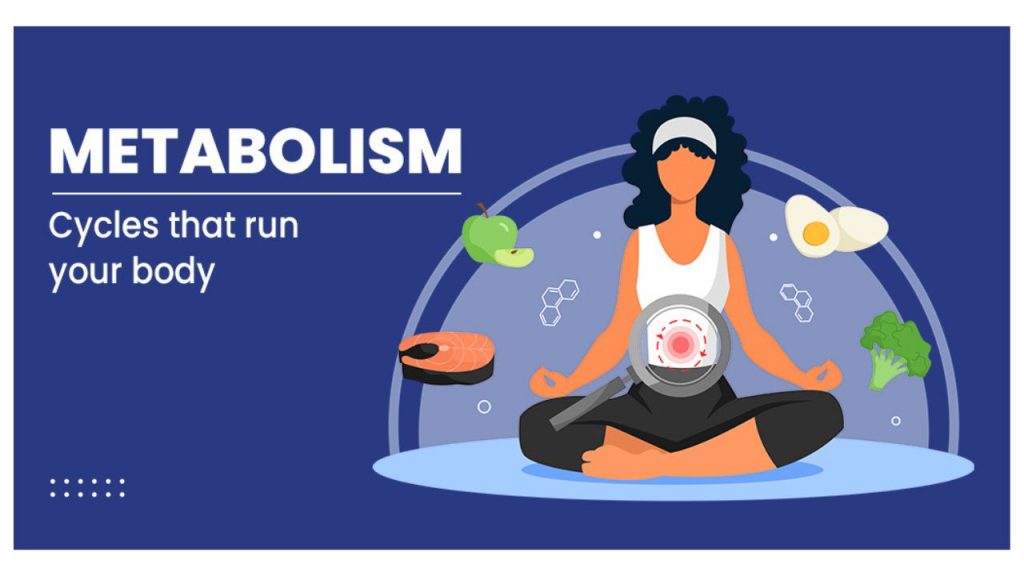We have all heard folks lament that their metabolism is so slow that they acquire weight even when they consume very little food. Why is “metabolism” such an important topic? Let’s investigate!
What is Metabolism?
The Basal Metabolic Rate (BMR), also known as metabolic rate, or simply metabolic energy, is the amount of energy (calories) that our body uses to maintain life, including for breathing, controlling body temperature, blood circulation, and various bio – chemical activities, as well as for the operation of different organs. For instance, our heart uses energy to pump blood throughout the body since it is a muscle pump. Similar to how our hearts need energy to beat, our kidneys, liver, and spleen also require energy for their function.
Energy is also used in several biochemical processes that take place in each and every cell in our body, including cellular-level processes, the transfer of molecules, etc. The entire amount of energy used for all of these “Metabolic Activities” necessary for maintaining life is referred to as Basal Metabolic Rate. (Read more here)
What makes Metabolism important?
Aside from the obvious fact that the myriad of biochemical processes and actions in our body are the foundation of our existence and life, metabolism also has an impact on our physical health. The amount of energy used by our body during metabolic processes is enormous; about 70% of the calories we burn each day are used for metabolism, with the remaining 30% used up for exercise and other activities like walking, talking, etc.
In other words, if your metabolic rate is low, you will spend (burn) significantly less energy throughout the day. This indicates that even with a moderate to low calorie consumption, you could easily reach a calorie surplus and gain weight.
This explains why hypothyroidism patients tend to put on weight quickly. Thyroid hormones are crucial in controlling metabolic rate. The metabolic rate slows and the overall energy expenditure decreases as the thyroid gland goes into hypothyroidism (hypo).
Lifestyle disorders are sometimes known as metabolic disorders since the majority of them, including diabetes, are a direct outcome of a compromised metabolism. The secret to treating such illnesses and being well is to improve metabolic parameters.
Remember, you cannot become healthier by losing weight. Instead, focus on improving your metabolic parameters and becoming healthier; weight loss will follow as a bonus!
How is metabolism measured?
The BMR can be calculated using mathematical formulae and models like the “Harris-Benedict BMR equation.” It’s crucial to remember that these equations are simply approximations. Your metabolic rate today might not be the same as it was yesterday because BMR is a highly changeable quantity. Numerous variables, like the person’s mood, the outside temperature, and others, might affect it. The basal metabolic rate (BMR) is also influenced by hormonal balances, body composition, and even genetics.
Also Read: How to reverse lifestyle diseases
Factors affecting the metabolism
Numerous variables, such as your mood, the climate, and even the spices in your food, can affect your metabolic rate. However, age, gender, hormones, body composition, size, your lifestyle habits and physical activity are the primary variables that significantly affect your metabolic rate.
We all experience muscle loss and a decrease in metabolic rate as we become older. This is a natural part of ageing and is known as age-related sarcopenia. Our body become increasingly prone to lifestyle disorders as the metabolic parameters decline. Men often have a higher metabolic rate than women of the same age, height, and weight. Age is yet another determinant. Another key measure of our metabolic rate is our body composition, or the ratio of muscle to fat.
Also Read: Smoking & Metabolism
Metabolically, muscle tissue is more active than fat tissue, using about three times as much energy. A person with a more muscle mass and less fat mass would would hence have better metabolic parameters. Our metabolism can be significantly altered by hormonal problems, particularly those that impact the thyroid gland.
Some fascinating facts about the various organs’ metabolic rates
- Only 2% of the body’s weight is taken up by the brain, but it accounts for 17% of the body’s total energy needs.
- The heart only makes up 0.5% of the total weight of the body yet uses 8% of daily energy.
- The liver makes just 2.6% of body weight yet accounts for a MASSIVE 19% of daily energy needs.
- It’s interesting to note that fat accounts for 21% of body weight yet only uses 3% of overall energy.
Also Read: How to reverse diabetes naturally?
How can metabolism be enhanced?
No particular fruit, vegetable, or technique can increase metabolism. A comprehensive lifestyle modification that includes a nourishing diet plan, enough sleep, and exercise will gradually and steadily increase metabolism. Weight training among all forms of exercise has a direct and immediate effect on raising metabolism.Adipose fat is metabolically less active than muscle tissue. In other words, muscle uses much more energy than fat. Skeletal muscle burns about 13 kcal for every kilogramme, but fat burns just 4.5 kcal per each kilo. Because of this, increasing muscle mass always aids in raising metabolism.
About NuvoVivo
NuvoVivo is an online health and fitness company that helps its client manage lifestyle diseases. Our clients join us from across the world to manage or reverse conditions such as diabetes (and its complications), cardiovascular diseases (hypertension, high cholesterol), fatty liver, PCOS, thyroid disorders etc. We help them reduce their reliance on medications through structured and scientific lifestyle changes that suit their cultural habits and medical conditions. Our team provides a diet plan, exercise plans and the necessary follow-up and support in helping them achieve this
Reach for Consultations @ https://bit.ly/NVConsultation
More about NuvoVivo @ https://linktr.ee/nuvovivo
For more details – +917994999735


This Post Has 2 Comments
Great write up
Thank you for sharing such an informative blog with us. I found this very useful for everyone. .